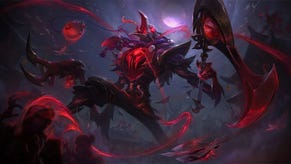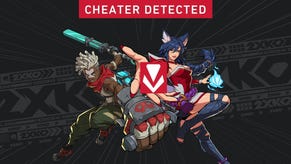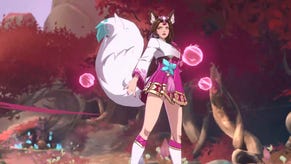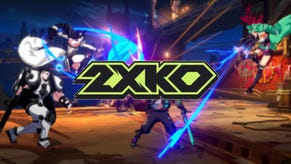Riot Games' Michael Sherman peels back the curtain on 2XKO's competitive future
Head of 2XKO esports Michael Sherman sits down and speaks about what Riot's goals and hopes are for their fighting game.
Fighting games are one of those genres where the competitive scene - that brutal arena where the game's best battle it out - is tied by the waist to the general gaming experience. This means that 2XKO, Riot Games' upcoming fighter due to have its first public alpha test this August, will inevitably have tournaments hosted around the world. The question of how Riot Games intends to step into the competitive fighting game space is frankly something that will have a widespread effect on the player base.
It's also a peculiar and intriguing topic. Riot Games has previously taken a very hands-on approach to managing the competitive spaces around games like League of Legends and Valorant, whereas as the fighting game scene has proven itself capable of building communities regardless of developer support. There's a justified belief that the community itself knows best, and that the best hands to grow a grassroots competitive scene belong to the tournament organizers who've been doing it for decades, rather than those with corporate backgrounds.
Even so, Riot Games has proven eager to hop in. Not only has the team behind 2XKO hosted private meetings with players and tournament organizers, but they've also hired former pro-players and TOs to the development team. The game was first made available at Evo, rather than a Riot event. Right now at least, there appears to be a genuine desire to work alongside pre-existing fighting game infrastructure, a sentiment echoed widely by the team.
It is obviously early days. The game isn't even out yet. But nonetheless I wanted to sit down and learn more about Riot's goals and plans for the 2XKO competitive scene. As such I was able to snatch Michael Sherman away from the Evo 2024 show floor for 15 minutes for one of the first interviews on the topic (save for the wonderful My Perfect Console podcast which managed to lock him down first). As the director of TFT and 2XKO esports at Riot, as well as someone with firsthand experience in the grassroots Smash scene, there's few others who could provide such an insight into what we can expect in the near future.
VG247: So, you're at Evo! What do you think of this event, its format, its structure, from a person in your position?
Sherman: "Evo is such an awesome feat to come here and see. This is my third Evo to see in person and my sixth I've followed over the years. I think especially in the last three years it's been really cool to see this explosive growth of Evo. What they're showing here this weekend - I've only been here for 30 minutes - but you can already see the improvements that are coming. Having the arena in the convention hall is such a cool level up to the experience of continuing to build. Where competition meets community, meets convention. It's this perfect mixture where you can walk through the artist alley, then to the 2XKO booth, then to pools is such a cool experience. As somebody who has been doing this at Riot for 10 years, it looks so different from what we're used to and what we produce, but that's what so exciting to see."
VG247: As part of it being different, that kind of leans into my main body of questions. Obviously, Riot is looking to create 2XKO and that'll inevitably have a competitive aspect to it. You said on a recent podcast episode of My Perfect Console that Riot's position is to be additive, rather than coming in and changing things up. Could you explain what you mean by that?
Sherman: "I've been in this role for two and a half years, and 2XKO has been in my job title for that time. I've got to admit, most of my time has been going to events and watching things, not putting together 'here's the master plan'. Because the real answer is we need to get the game out there and see how the community plays it, what they build around it. We have some theories and things we're excited about, but in order to be additive we need to get it into the players' hands and see where they take it."
"Now there's a strong foundation in the fighting game scene that means, well okay, we expect that major tournaments will want to run 2XKO. So how do we make sure we're ready to support that, and how do we be additive on top of that. It also means we don't believe the right way to enter that space will be anything we've done for other games where we're like 'here are our events that we're running that are for us, and don't have other games'. Here we've realized there's a lot more partnership and collaboration that comes with the rest of the community. We think it's critical for success that we have to partner with [the community] to be additive."
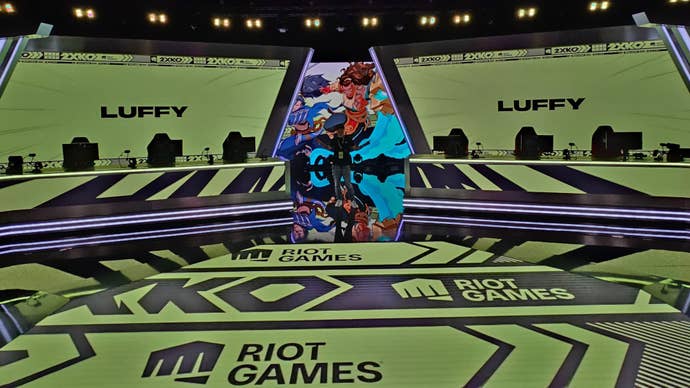
VG247: I was going to ask, Riot Games hasn't had to run open-bracket events like Evo in the past, keeping the competitor count relatively limited, rather than go open bracket. Do you foresee any challenges with stepping into this different style of competitive space?
Sherman: "The unique element of fighting games is that there's a lot of components that make it way easier to run operationally than a lot of our other titles. The fact you can have a thousand consoles in here and run a thousand games at the same time, and those games are ten minutes each, means that you can cycle through so much. To do that for League of Legends or Valorant for example would require a floor space that's 10 times this. A lot of our history actually came from there not being a great infrastructure to support the type of game we've done previously. So we've had to build our own events to build the experiences our players want."
VG247: In the past Riot Games has been very hands-on with their competitive scene, folding keeping all major tournaments under its belt. Now it's been different with TFT, which started very grassroots and now has major events around it. Do you see Riot taking an approach similar to League where all major events are very Riot-controller, or will you play loose with it?
Sherman: "If you look at either of them, I don't think they have the model that best describes the way we'll support the fighting game space. All of them have a model that is unique to the needs of that game and ecosystem. I think that Evo is an example will be Evo's show, and I think Riot will want to support Evo. We have a long-standing relationship with the Cannons and Rick (general manager of Evo), RTS, and Sony (both corporate owners of Evo). We want to be really good partners there."
"I think that we will be entering this scene - like with TFT where we do kind of partner with the grassroots but there aren't actually that many grassroots [events]. The span of fighting games requires you to approach this a little bit differently. We do want to make sure the ecosystem that's here is able to run with our game the way the community believe is best to run with it and grow it. We want to be partners in building that, and I think that might feel a little different than other publishers have approached it, but it's the way we'd want to commit to the space."
VG247: You mentioned earlier a lot of your work so far has been going out to events. What have been your main findings from that?
Sherman: "I think my favourite is, and I've played fighting games for a long time. Particularly Smash Bros, I was deep in the grassroots Smash scene. There are some similarities that I knew coming in. The element of why are you here as a player? You may be coming to go 0-2 and then hanging out with friends for the weekend. That is such a different version than, 'I'm here because my favourite team or player is here'. It's much more about how a community gets together and celebrates with their friends and like-minded people, more-so than what I've seen from other esports. And just the way that players have fandom in this space is something that's incredibly unique and fun to see."
VG247: In terms of that aspect, you've seen other esports have historically had money issues, whereas fighting games have slowly and steadily grown because of the turn up in-person culture, among other factors. Is it safe to say that's something an approach you appreciate as opposed to franchised esports, especially in these trying times? Building an esports scene right now must be a bit of a nightmare.
Sherman: "I can't speak for the whole industry; I can speak for Riot. Where we're at as esports is we do put considerable investment into building our games, and we see that as part of the overall experience. To build League of Legends or Valorant, or TFT the way we envision they need to live, we need to make investments. The same way you'd like to invest in server costs, which may be more expensive but allow us to give the players the experience that we believe in. So bringing this all back, when we think about entering a new esports or a new game, it comes back to what is the experience we're trying to build, what does it look like as a whole, and whether it's the right way for us to enter the space."
"So it's not daunting. I'd say it's not daunting because at the core of it we're still thinking about how we can build the best experience for players around the world, and how we can go into a genre with our unique spin. [...] While there are things around the industry that are challenging, we still feel really excited to support."
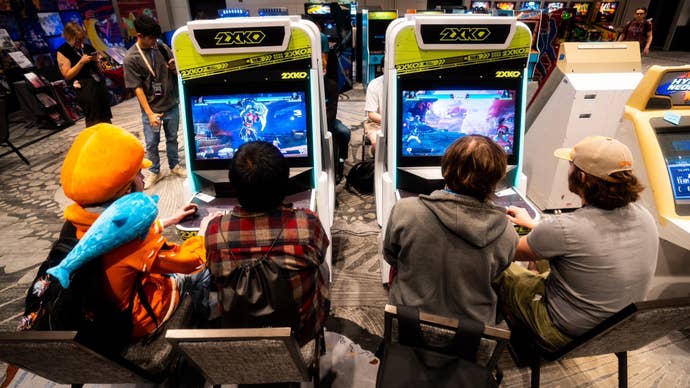
VG247: Do you think it's fair to say the fighting game scene is cheaper to invest in? Like you said, these events are already here, the community will already run tournaments on their own.
Sherman: "I think it means you have to think about your investments differently. I don't know if it means it's considerably cheaper. It means, if I don't need to build the event from the ground up, what does support actually look like? How do you be additive, how do you produce content? How do you leverage Riot's capabilities? We have broadcast studios across the world and production facilities. Can we localize events in more languages? Can we help produce more content? Even though the event as a foundation is built, we can focus our resources on other areas."
VG247: You've spoken a lot about being additive, just to help clarify is that sort of support what you mean? Helping to promote events coming up on Riot channels, producing content around tournaments, that sort of thing?
Sherman: "Those are a list of possibilites, none of them are like, exactly what we're going to do. I'd say this, we want the experience to be reflective of what is going on in the community."
VG247: In the past, competitors not just in Riot competitive scenes but other games too, have been contractually locked-in to play their chosen game. I know years ago Doublelift stated on stream he wanted to compete at Evo and wasn't able to because of such restrictions. With fighting games having this culture of open competition, with many competitors signing up for multiple games at once, will this be in place?
Sherman: "I'd like to frame this as, if we're not running the events or running a franchise system, it's not our place to say whether or not to say if players are playing in both. We think that's part of what makes fighting games awesome. One of the reasons why you may come here is to sign up for three or four games, and we wouldn't want to take away from that. It's part of being additive. When we look at our other games, being a professional League of Legends player is a full-time job! But the cool thing is that with fighting games it can extend outside of that. Leffen is an example, he came to play at the TFT Vegas open last year. In a world where we say, you can't play other games, we'd miss out on that opportunity."
2XKO will be playable for those accepted into its alpha labs test starting August 8. For everyone else, the game will be released in full at some point in 2025. Hang in there!




